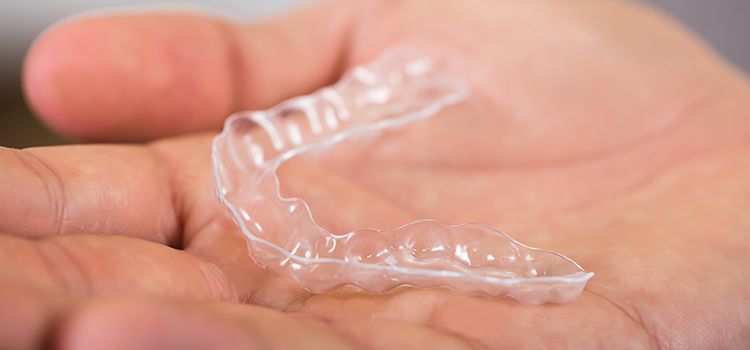TMJ Splint Vs Night Guard
9th May 2021

The terms splint and night guard are often used interchangeably, but there is some nuance to the meanings. It’s important to understand what your dentist is referring to if he or she recommends a TMJ splint vs. night guard for bruxism or TMJ. TMJ stands for temporomandibular joint, but is commonly used interchangeably with TMD, which stands for temporomandibular joint disorder.
Night guards are very popular dental appliances; it’s highly likely you know at least one person who uses one every night. However, the TMJ splint is a device you may not have heard of, so you might be confused if your dentist recommends it for treatment.
Before you can make an informed decision on whether to use a TMJ splint or a night guard, we’ll help you understand what each is and why your dentist might recommend one over the other.

What is the Difference Between a Splint and a Night Guard?
Although you might have heard the terms splint and night guard used interchangeably in the past, they do not always mean the same thing. You may have also heard terms like dental splint, occlusal splint, bite splint, or bite guard for TMJ. So, what is the difference between a splint and a night guard?
A night guard is a type of splint, meaning that all night guards are splints, but not all splints are night guards. Each type of splint is designed for a specific purpose and serves a different function. For example, there are different types of splints for TMD, such as stabilization (or permissive) splints, repositioning splints, and nociceptive trigeminal inhibition tension suppression system (NTI-tss) devices.

Splints for TMJ
Each of these splints work in different ways to address TMD. In general, splints for TMJ allow your jaw muscles to relax, distribute pressure evenly across your teeth, reduce the strain on your joint, and help reposition your jaw into proper alignment. These splints are also useful because by examining the wear on the splint, dentists can often diagnose your condition.
- Stabilization Splint:
Stabilization splints, also known as permissive splints, aim to eliminate harmful contact between the teeth and provide a bite surface which is harmonious with the jaw joints. In his book, Orofacial Pain: Guidelines for Assessment, Diagnosis, and Management, Reny de Leeuw explains the effectiveness of the stabilization splint: “wearing the appliance increases the patient’s awareness of jaw habits and helps alter the rest position of the mandible to a more relaxed, open position” (2013). This helps alleviate pain by allowing the jaw muscles to relax.
- Repositioning Splint:
Repositioning splints, true to their name, aim to reposition the jaw for ideal alignment. These splints include indentations that do not allow your teeth to glide across the occlusal (bite) plane. A study conducted in 2019 found that repositioning splints helped to alleviate TMJ symptoms in 75.82% of the participants after 12 months of treatment. These symptoms included disc alignment and jaw clicking (Zhigui, et al.)
- NTI-tss Device:
An NTI-tss device is worn only on the top front teeth and stops clenching and grinding. This type of NTI dental appliance for TMD is particularly helpful for reducing migraines and headaches related to facial pain.
Dentists usually recommend patients use TMJ splints for short-term relief only. There is concern that they can change your bite with long-term use. As such, if you are prescribed a TMJ splint, it is imperative that you have regular oversight from your dentist to ensure the safety of your teeth and jaw.
Unlike night guards, TMJ splints are often worn on both the upper and lower jaw. They can relieve symptoms of bruxism similarly to a night guard, but they are only intended to be used by people who actually have TMD. If your dentist recommends a TMJ splint instead of a night guard, it’s likely because he or she has concluded that the benefits of a splint for TMD outweigh the benefits of a night guard based on your condition and symptoms.
Night Guard for Bruxism
A night guard is designed to treat bruxism and can sometimes come recommended before a TMJ splint, particularly if your bruxism eventually causes TMD. A night guard is a special type of splint that helps treat teeth grinding by providing a barrier between the top and bottom teeth. A night guard is a device you wear while you’re sleeping to protect your teeth from the effects of bruxism.
Night guards are sold over-the-counter, through dental offices, and via online retailers like Pro Teeth Guard. When you buy a night guard from your dentist or from an online retailer, you’ll get a custom-fit, professionally-made night guard that is designed to perfectly match your teeth. Night guards are typically only worn on the top or bottom teeth. About 90% of patients prefer the upper night guard as it is usually more comfortable, but some patients opt for the lower night guard if they have had dental work on the top teeth. Three of the most common types are soft night guard, hybrid night guard, and hard night guard.
- Soft Night Guard:
A soft night guard is made of a squishy, soft, rubber material. This type of night guard helps reduce the symptoms of bruxism by putting that soft barrier between the teeth. It’s typically recommended for people with mild bruxism.
- Hybrid Night Guard:
A hybrid night guard is made of a soft rubber material inside and a hard acrylic outside. This also provides a barrier between the teeth, but it gives a more comfortable feeling inside while providing a strong barrier on the bite surface. This night guard is recommended for those with moderate to heavy grinding.
- Hard Night Guard:
A hard night guard is made of hard acrylic both inside and outside. They are typically recommended for the heaviest grinders because the acrylic material is extra durable.

- Most Popular
- Hard Outside, Soft Inside
- 2MM Thick
- Moderate / Heavy

- Most Durable
- Hard Materials
- 1.5MM Thick
- Heavy / Severe

- For Day Time Use
- Thin, Barely Visible
- 1MM Thick
- Light / Moderate

- For Clenching
- Flexible & Soft
- 1.5MM Thick
- Light / Moderate
With so many different types of dental appliances, how do you know which one to choose? Ultimately, you should make a decision based on a discussion between you and your dentist. The best splint or night guard for you is going to depend on whether you have bruxism, TMD, or both; the severity of your disorder; which symptoms you’re trying to treat; and recommendations from your dentist.
Related Articles:
- Upper Or Lower Night Guard
- Soft vs Hard Night Guard
- Dental Night Guard Side Effects
- Can Mouth Guards Make TMJ Worse?
Differences Between TMJ Disorder and Bruxism
TMD and bruxism are not one in the same, even though they can have similar symptoms.
What is TMJ Disorder?
TMJ disorder is a condition in which there is dysfunction in your jaw joint. Because of this dysfunction, you might experience:
- Jaw pain
- Facial pain
- Headaches
- Locking jaw joint
- Clicking jaw joint
- Difficulty opening or closing your mouth
It’s often very hard to determine one single cause of TMD because TMJ symptoms can appear unrelated, but the condition is associated with arthritis, bruxism, injury to the jaw joint, and connective tissue diseases, among others.
What is Bruxism?
Bruxism is a condition in which you grind your upper and lower teeth together, typically at night. This is a fairly common condition; it is estimated that between 8% and 31% of the adult population suffer from bruxism. When you grind or clench your teeth, it can lead to:
- Tooth pain
- Tooth sensitivity
- Headaches
- Ear Pain
- Other oral health issues
- Fatigue from lack of sleep
Scientists have not yet found a definitive cause for bruxing, but the condition is connected with anxiety, stress, sleep apnea, certain medications, and dementia, among others.
Related Articles:

The Bottom Line
If you are having pain or soreness in and around your jaw, it’s possible the culprit is either TMD, bruxism, or both. Finding the right therapeutics and treatments might take time, and it might involve switching from a night guard to a TMJ splint. With the help of research, examinations, and open communication about your symptoms, your dentist can help you decide which treatment option is best for you.
While TMD and bruxism are two different conditions, they can manifest very similarly and come with similar side effects. Night guards and splints are both removable orthotics which help to alleviate bruxism and TMJ pain, but it is important to find the best treatment to prevent future injury to the teeth and jaw as well.
At Pro Teeth Guard, you can get custom-fit night guards at an affordable price. We make our night guards in a professional dental lab, and every night guard is guaranteed to fit comfortably with our 110% money-back guarantee.
Sources:
- Dylina, T. J. (2002). The Basics of Occlusal Splint Therapy. The Basics of Occlusal Splint Therapy | Dentistry Today. https://www.dentistrytoday.com/prosthodontics/prosthetics/1716--sp-978340117
- De Leeuw R, Pain O (2013) Guidelines for assessment, diagnosis, and management. (5th ed), Quintessence Publishing Co, Inc, Chicago.
- Manfredini, D., Winocur, E., Guarda-Nardini, L., Paesani, D., & Lobbezoo, F. (2013). Epidemiology of bruxism in adults: a systematic review of the literature. Journal of orofacial pain, 27(2), 99–110. DOI: 10.11607/jop.921
- Mayo Clinic Staff. (2018). TMJ disorders. Mayo Clinic. https://www.mayoclinic.org/diseases-conditions/tmj/symptoms-causes/syc-20350941
- Ma, Z., Xie, Q., Yang, C. et al. (2019). Can anterior repositioning splint effectively treat temporomandibular joint disc displacement?. Sci Rep 9, 534 https://doi.org/10.1038/s41598-018-36988-8

- Most Popular
- Hard Outside, Soft Inside
- 2MM Thick
- Moderate / Heavy

- Most Durable
- Hard Materials
- 1.5MM Thick
- Heavy / Severe

- For Day Time Use
- Thin, Barely Visible
- 1MM Thick
- Light / Moderate

- For Clenching
- Flexible & Soft
- 1.5MM Thick
- Light / Moderate

